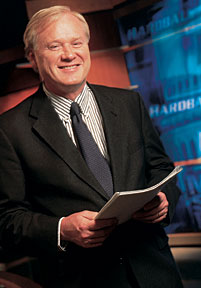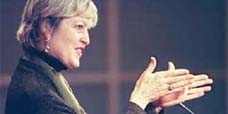
"This brings me to the special relationship Washington books have with the Washington consumer. Whenever we're invited to someone's house in Georgetown, Cleveland Park or wherever, the walls have their appointed purpose: bookshelves. You are to know upon entering the sort of people who live there." Television Journalist Chris Matthews served as a Peace Corps Volunteer in Swaziland in the 1960's.
Chris Matthews writes: The Washington Read
The Washington Read
By Chris Matthews
Sunday, July 2, 2006; Page B01
When my book "Hardball: How Politics Is Played Told by One Who Knows the Game" was published in June 1988, I sent copies to some reporters and politicians. I've saved one classic response.
Dear Chris, Thanks for the warm inscription in Hardball. I immediately flipped to the index and went through pages 36, 77, 95-96, 202, 206. Having emerged unscathed, I'll now happily read the full book. Thanks and best of luck with Hardball. George Bush.
Here was this guy, a sitting vice president in the midst of a presidential campaign, not only thanking me for a book, but confessing proudly to having given it The Washington Read. In that, George H.W. Bush was truly a creature of D.C. Here, in our busy, ambitious city, many people ravage books like Wild West hunters once attacked the buffalo. Unlike the Plains Indians who harvested the entire animal -- meat, horns, skin, hooves -- for their needs, we buy a book simply to cut out its tongue -- that one tasty tidbit that justifies the read.
We'll buy Douglas Brinkley's " The Great Deluge " about Hurricane Katrina just to read about how New Orleans Mayor C. Ray Nagin held up a news conference with President Bush so he could shave his head in the Air Force One bathroom. We buy " Cobra II " by Michael R. Gordon and Gen. Bernard E. Trainor just to get a military man's view of how the hell we got into the Iraq war in the first place. But we're also forced to make constant choices. Who's going to take a dusty trudge through Jerry Bremer's entire book on his year as czar of Iraq, after all, when they can do a rapid, hard-target search through Ron Suskind's latest effort to uncover Dick Cheney's " One Percent Doctrine "?
There's a lot to be said for this kind of book butchery. With publishers churning out ever more books on politics and other nonfiction topics, The Washington Read is a vital expedient. Most books under the heading of "current affairs" contain a central point that can be readily grasped. Barbara Leaming's "Jack Kennedy: The Education of a Statesman" explains, really for the first time, how the appeasing, isolationist, selfish Joseph Kennedy could have had a son as bold, internationalist and, yes, generous, as JFK. Leaming chalks it all up to the influence of Winston Churchill, first through the great man's writing, later through the living influence of Churchill disciples David Ormsby-Gore and Harold Macmillan, both trusted friends of the younger Kennedy.
The same is true of last year's "The Cold War: A New History" by John Lewis Gaddis. That book had a trio of surprises: first, that Soviet wartime leader Joseph Stalin believed that even a one-year delay of the Normandy invasion would have given him the chance to grab all of Europe; second, that Stalin was so ideologically delusional as to believe that the United States and Great Britain, both being capitalist, would inevitably go to war with each other; and third, that the missiles Nikita Khrushchev delivered to Cuba in 1962 were strategic, meant not to defend Cuba from attack but as nuclear blackmail to get the United States out of Berlin.
Less monumental efforts also have a tongue to be yanked from the animal. I learned from Jerry Lewis's "Dean and Me" -- a warm and wonderful book about the comic's pairing with Dean Martin -- that a mobster named Willie Moretti really did put a pistol in the mouth of bandleader Tommy Dorsey to get the young Frank Sinatra out of his contract. Yes, Moretti was the real Luca Brasi.
Washingtonians, whether in politics, government, media or academia, must find devious ways to search out such morsels -- and quickly. I've come across several methods.
First, we can read the whole book. Given my job hosting "Hardball" Monday through Friday and "The Chris Matthews Show" on Sunday, I've sometimes read entire books on deadline, usually with the help of a weekend before the booking date. I read Tim Russert's "Big Russ and Me" out of collegial courtesy, then found myself loving Russert's true-life saga of filial devotion. Occasionally, I've been fortunate to have read a book, sometimes in galley proofs, before learning of my assignment to interview the author. As a Churchill buff and a Kennedy fan, I found that to be the case with Leaming's book. Many must know, since I have trumpeted it so often, my enormous affection for Jon Meacham's "Franklin and Winston," a loving portrait of the two leaders who delivered us from evil. And being a movie nut, I had no problem making my way through Richard Schickel's biography of filmmaker Elia Kazan.
Second, we "go through it." Here I dare to speak for tens of thousands of Washingtonians. This second method of book assault relies on a bit of luck, jumping from page to page, hoping to spot the interesting stuff. It relies too, on the metabolic need to underline.
Going through a book, I insist, deserves a special place between "I read that book" and a bookstore scan. "Yeah, I [wait a beat] went through it ." I did this with Joe Klein's new book, "Politics Lost," about how political consultants use focus groups and other state-of-the-art techniques to drain their candidates of passion. (I read enough to learn that he goes after spinmeisters Pat Caddell and Bob Shrum with special relish.)
The third Washington Read, to which I also plead guilty, is to start a book at the beginning and then put it aside. In recent weeks, I've started Terry Coleman's biography of Laurence Olivier, David Remnick's "Reporting" and "Verdict on Vichy" by Michael Curtis. I bought the Olivier book because anyone who was recognized as the best in their profession is worth getting to know a lot more about; the second because Remnick is an amazing writer and this collection of writings has a first article on Al Gore; and the Vichy book because I've long been fascinated by, and now after reading more about it revolted by, the French behavior under occupation. The most honest claim for such one-night stands is: "I started it." For TV interviewers, this can suffice. You can know whether it's well written from the first several pages. If it is, you can tell the author that up front. Offering a positive literary critique breathes a certain joy into the process.
Fourth option: desperation. When I have an impressive author headed my way and not enough time to meet him or her on equal terms, I ask the publicist to find out which chapter the writer considers best or most emblematic -- what journalists call the "nut" of an article. You may be surprised to know that even the most finicky of authors is amazingly agile in coming back with a favorite. You know, the one that will sell.
This brings me to the special relationship Washington books have with the Washington consumer. Whenever we're invited to someone's house in Georgetown, Cleveland Park or wherever, the walls have their appointed purpose: bookshelves. You are to know upon entering the sort of people who live there.
I imagine residents of other cities don't use their main entertaining rooms -- living rooms, large dens, other sitting areas -- to stack so many books. It's as though we here in the nation's capital are all still in graduate school, but with a lot more money. In the hinterlands, people don't flaunt their intellectual life like this.
New York may have its own book displays. I imagine the shelves on the Upper West Side stacked with old Norman Mailer and perennial John Updike or the great new memoir "A Writer's Life" by Gay Talese. We Washingtonians restrict fiction to our bedrooms. Out front, it's all post-World War II history, all Current Events. Here, David McCullough's "Truman" presides as predictably as a hotel's Gideon Bible. Somewhere nearby, especially in those storied Georgetown townhouses, sits David Brinkley's "Washington Goes to War," like the toy soldier waiting for its young owner to return. We have books grouped by presidents: Bill Clinton's "My Life" going back to -- but rarely further than -- Doris Kearns Goodwin's "No Ordinary Time" on the wartime Roosevelts. In a very Republican household, we'll spot the Peggy Noonan paean -- "What I Saw at the Revolution" -- to Ronald Reagan.
My distinction is having a complete nine-volume collection of Jimmy Carter's presidential speeches, some of which I had a hand in writing -- yes, those were the words of professionals! -- along with the usual presidential collection cited above, plus an early edition of "Advise and Consent," recently delivered from Amazon.com. Having read the novel in high school, I wanted to know if the old grandeur of the Senate was still there. It is, if only in the book -- and in the Otto Preminger movie that got this reader so excited about Washington in the first place.
Do the Washington folks who flaunt their book collections read these books? My kind bet is that they do. Why? Because they give us the core of what Washington not only wants to be but is. There's a reason those books on the presidency dominate our shelves. Whoever sits in the White House establishes this city's historic calendar. We not only think of the Clinton (or Reagan or Carter) era here, we recall it. Together, the presidencies constitute this city's reason to be, its claim to fame. Just as we know that every book has its core, the core to our community is our shared respect for the political history made -- and written about -- here. It's the tongue we all need from the buffalo.
Chris Matthews, host of MSNBC's "Hardball" and NBC's "The Chris Matthews Show," is author of several Washington reads, including "Kennedy and Nixon: The Rivalry That Shaped Postwar America" (Free Press).





















